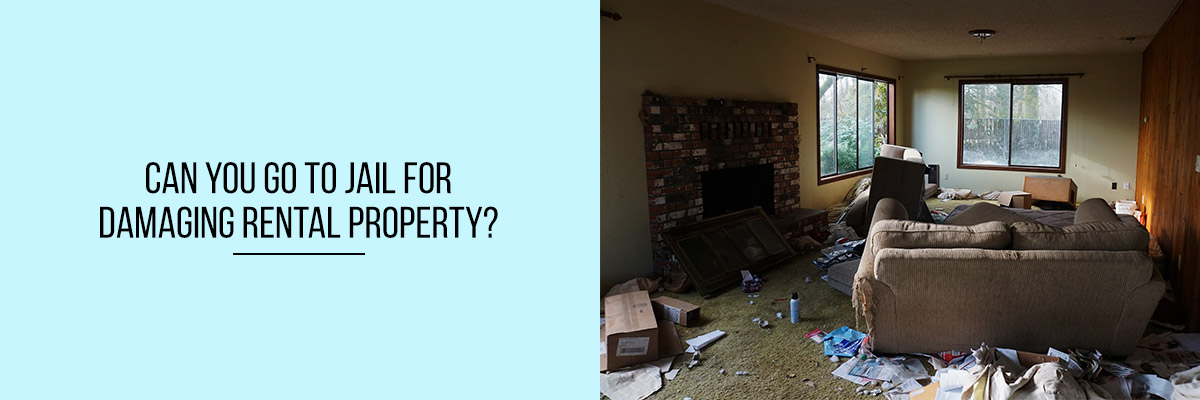If you are a tenant in the US and you are wondering if damaging the rental property can make you go behind bars, then this blog is for you.
First of all, you have to know the difference between normal wear and tear and serious extensive damage. If what you’ve done is mostly normal wear and tear like minor scuffs and scratches, nail holes, loose doorknobs, worn-out carpet, faded blinds, curtains, etc., then this is fine and no landlord can drag you into legal issues. It also depends on how long you’ve occupied the property for renting.
If there is serious damage like big holes in the wall, broken doors, and windows, stained carpet beyond normal cleaning, mold growth, inoperable appliances due to misuse, etc., and the damage exceeds your security deposit, then it is considered vandalism and malicious destruction of the property. So, yes in this case you can go to jail or will be liable to pay for the compensation.



Let’s understand this in detail.
Understanding Tenant Obligations:
As part of a lease agreement, you agree to certain terms and conditions, including maintaining the property in good condition. In other words, you have to report any damage as soon as possible and take reasonable care of the place. You could get in trouble if you don’t.
Civil vs. Criminal Liability:
Damage to rental property is typically covered by civil liability, not criminal liability. Basically, civil liability means you can be sued for damages by your landlord or property manager. In this case, you might have to pay for repairs or replacements.
In some cases, however, damaging rental property could result in criminal charges. If there has been intentional damage, such as vandalism or arson, criminal charges may be filed. If the perpetrator is found guilty, criminal charges can be filed against him or her by the authorities.
Legal Consequences:
If you’re found responsible for damaging rental property, whether through negligence or intentional actions, you could face various legal consequences:
- Financial Liability: You may have to pay the landlord for repairs or replacements. It could include materials, labor, and additional expenses incurred as a result of the damage.
- Eviction: You might be wondering if you can evict the tenant from the property based on the damages he/she has done. Then let me tell you that yes, you can do that. If you are a tenant who has damaged the property then be prepared because your landlord may decide to evict you based on the severity of the damage and the terms of your lease agreement. If you violate your lease, including causing property damage, eviction proceedings can be initiated.
- Civil Lawsuit: If the landlord is unable to recover damages from you, he may file a civil lawsuit against you. In the event that the case goes to court and you are found liable, the court may order you to pay the landlord a certain amount.
- Criminal Charges: If you intentionally damage property and cause severe damage, you may face criminal charges such as vandalism or malicious destruction. It depends on the severity of the offense and whether you will be subject to fines, probation, or even jail time. This is why you make this a rule of doing criminal background screening of potential tenants. Also, make sure that you are aware of the gun violence in public housing communities, and measures to avoid legal consequences because of criminal activities in your residence.
Mitigating Factors:
It’s essential to understand that each case is unique, and several factors can influence the outcome:
- Intent: Accidental damage is usually treated differently from intentional damage. You may be able to mitigate the consequences of the damage if you can prove that it was unintentional.
- Reporting: Informing your landlord immediately of any damages can demonstrate your willingness to take responsibility and resolve the issue.
- Cooperation: If you cooperate and are proactive in dealing with the damage, this will also benefit you.
Preventive Measures:
To avoid potential legal issues related to damaging rental property, consider the following preventive measures:
- Take care of the property: Treat the rental property as if it were your own. Keep it clean and well-maintained to minimize the risk of damage.
- Report issues promptly: If you notice any damage or maintenance issues, report them to your landlord or property manager immediately.
- Get renter’s insurance: Renter’s insurance can provide financial protection in case you accidentally damage the property or if your belongings are stolen or damaged.
Final Words:
There is a possibility of facing criminal charges unless the damage is intentional and severe. While damaging rental property can have serious consequences, including financial liability and potential eviction, the likelihood of facing criminal charges is relatively low. As a tenant, it’s essential to understand your obligations, take preventive measures, and address any issues promptly to maintain a positive relationship with your landlord and avoid legal troubles. Remember, communication and cooperation are key to resolving disputes and minimizing the risk of legal action.


